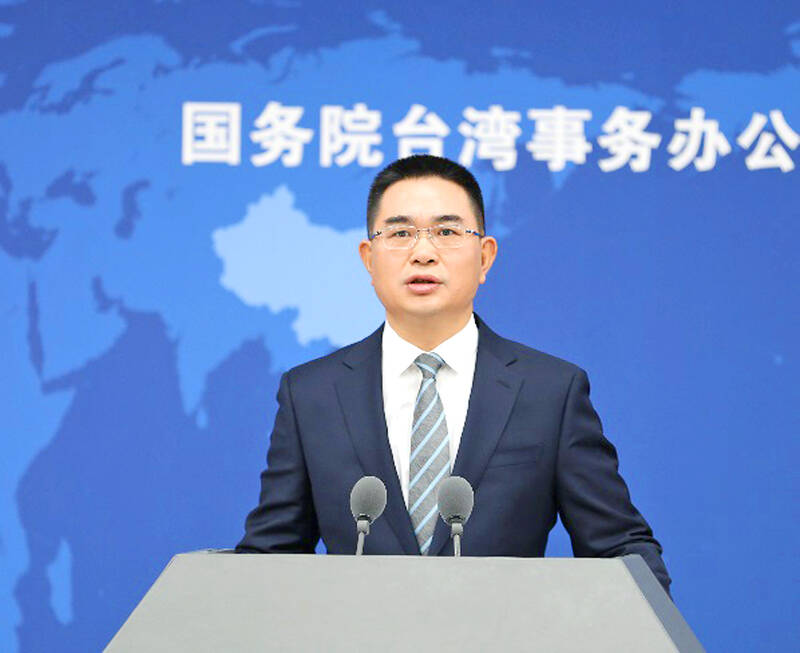The Chinese Communist Party (CCP) is setting political thresholds that would hinder, if not make impossible, efforts by incoming president William Lai’s (賴清德) administration to initiate dialogue with China, experts said yesterday.
Citing comments by China’s Taiwan Affairs Office spokesman Chen Binhua (陳斌華), Taiwan Thinktank researcher Wu Se-chih (吳瑟致) said that the CCP was asking the impossible by demanding that the Democratic Progressive Party (DPP) set aside its Taiwanese independence stance.
Commenting on Lai’s inaugural address on Monday next week, Chen said that any Taiwanese party willing to recognize Beijing’s “one China” principle would face “no difficulties” when interacting with the CCP, adding that cross-strait dialogue is only possible if the DPP abandons its Taiwanese independence stance.

Photo: Screengrab from the Internet
Taiwanese independence cannot coexist with cross-strait peace, Chen said, adding that Beijing is adamant that Taiwan observe the “one China” principle and the so-called “1992 consensus” to promote peaceful cross-strait relations with the ultimate aim of unification.
The so-called “1992 consensus” — a term that former Mainland Affairs Council chairman Su Chi (蘇起) in 2006 admitted making up in 2000 — refers to a tacit understanding between the Chinese Nationalist Party (KMT) and the CCP that both sides of the Taiwan Strait acknowledge that there is “one China,” with each side having its own interpretation of what “China” means.
Wu said that the CCP’s demands were tailored to make it difficult for the DPP, and that China could very well demand that the KMT give up its claims that the Republic of China (ROC) is a sovereign state.
After all, the CCP considers the ROC defunct and its existence creates the “two Chinas” issue, he said.
Lai would never accept the “one China” principle, and his inaugural address would clarify how Taiwan would approach cross-strait relations based on Taiwanese sovereignty and the sovereignty of the ROC, he said.
Lai has also made it clear that any interaction with China would be based on the understanding that the nations are on equal footing, he added.
China’s actions over the past few years have left no room for the ROC’s interpretation of “one China” and that it willfully ignores Taiwan’s stance, Wu said.
If China insists on placing prerequisites on cross-strait dialogue, it is to blame for undermining cross-strait relations, he said.

Taiwan is to commence mass production of the Tien Kung (天弓, “Sky Bow”) III, IV and V missiles by the second quarter of this year if the legislature approves the government’s NT$1.25 trillion (US$39.78 billion) special defense budget, an official said yesterday. Commenting on condition of anonymity, a defense official with knowledge of the matter said that the advanced systems are expected to provide crucial capabilities against ballistic and cruise missiles for the proposed “T-Dome,” an advanced, multi-layered air defense network. The Tien Kung III is an air defense missile with a maximum interception altitude of 35km. The Tien Kung IV and V

The disruption of 941 flights in and out of Taiwan due to China’s large-scale military exercises was no accident, but rather the result of a “quasi-blockade” used to simulate creating the air and sea routes needed for an amphibious landing, a military expert said. The disruptions occurred on Tuesday and lasted about 10 hours as China conducted live-fire drills in the Taiwan Strait. The Civil Aviation Administration (CAA) said the exercises affected 857 international flights and 84 domestic flights, affecting more than 100,000 travelers. Su Tzu-yun (蘇紫雲), a research fellow at the government-sponsored Institute for National Defense and Security Research, said the air

A strong continental cold air mass is to bring pollutants to Taiwan from tomorrow, the Ministry of Environment said today, as it issued an “orange” air quality alert for most of the country. All of Taiwan except for Hualien and Taitung counties is to be under an “orange” air quality alert tomorrow, indicating air quality that is unhealthy for sensitive groups. In China, areas from Shandong to Shanghai have been enveloped in haze since Saturday, the ministry said in a news release. Yesterday, hourly concentrations of PM2.5 in these areas ranged from 65 to 160 micrograms per cubic meter (mg/m³), and pollutants were

Taiwan’s armed forces have established response protocols for a wide range of sudden contingencies, including the “Wan Chun Plan” to protect the head of state, the Ministry of Defense (MND) said today. After US President Donald Trump on Saturday launched a series of airstrikes in Venezuela and kidnapped Venezuelan President Nicolas Maduro, concerns have been raised as to whether China would launch a similar “decapitation strike” on Taiwan. The armed forces regularly coordinate with relevant agencies and practice drills to ensure preparedness for a wide range of scenarios, Vice Minister of National Defense Hsu Szu-chien (徐斯儉) told reporters before a